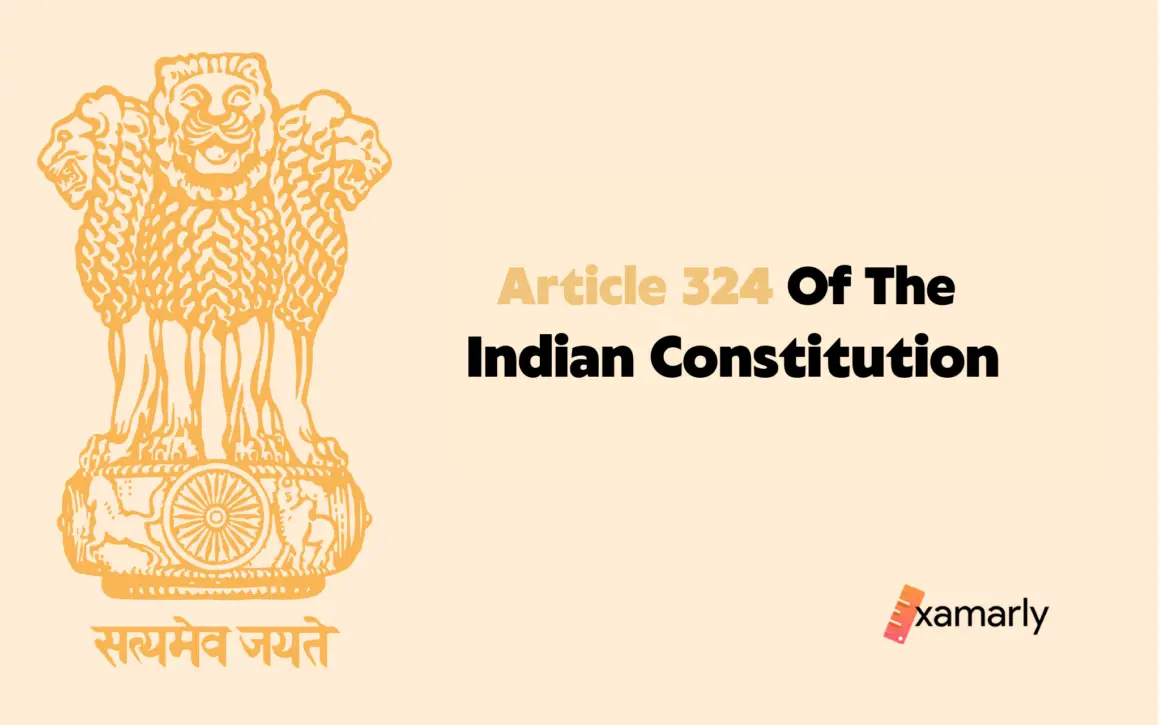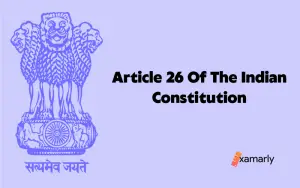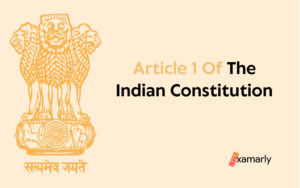Article 324 of the Indian Constitution talks about the Election Commission of India and its power to superintend, direct, and control the preparation of the electoral rolls and the conduct of elections to Parliament and to the Legislatures of each State, as well as the elections to the offices of President and Vice President of India.
It also gives the Election Commission the power to issue directions or orders for the purpose of ensuring the purity of elections and the smooth functioning of the electoral process.
The Election Commission is a constitutional body independent of the government’s executive branch.
Before diving deep into Article 324 of the Indian constitution, let us go through some of the key concepts that are pivotal to the aforementioned Article.
- All About Election Commission of India
- Article 324 of the Indian Constitution – In Detail
- Clause 1 – As it is & Explained
- Clause 2 – As it is & Explained
- Clause 3 – As it is & Explained
- Clause 4 – As it is & Explained
- Clause 5 – As it is & Explained
- Clause 6 – As it is & Explained
- FAQs on Article 324 of the Indian Constitution
- What is the Election Commission of India?
- Who appoints the members of the Election Commission of India?
- How is the independence of the Election Commission of India safeguarded?
- What are the powers and functions of the Election Commission of India?
- Can the Election Commission of India be approached for any grievances related to the electoral process?
All About Election Commission of India
The Election Commission of India is a constitutional body responsible for administering and conducting elections to the national and state legislatures in India.
It was established on January 25, 1950, and is headquartered in New Delhi. The Election Commission is headed by the Chief Election Commissioner, assisted by one or more Election Commissioners. The Chief Election Commissioner and other Election Commissioners are appointed by the President of India and hold office for a term of six years or until they reach the age of 65, whichever is earlier.
The Chief Election Commissioner and other Election Commissioners enjoy the same rank and status as a judge of the Supreme Court of India.
The main functions of the Election Commission of India are:
- To conduct free and fair elections to the national and state legislatures in India.
- To enforce the provisions of the Constitution and other laws relating to elections.
- To prepare and revise electoral rolls, and to delimit the constituencies for elections.
- To recognize political parties and to allocate symbols to them.
- Register parties and candidates for elections.
- To conduct voter education and awareness campaigns.
- To appoint and deploy election observers to oversee the electoral process.
- To declare the results of elections and to issue election certificates to successful candidates.
The Election Commission of India is an independent body that operates without interference from the executive branch of the government. It is committed to ensuring the conduct of free and fair elections in the country, and to safeguarding the integrity of the electoral process.
Let us delve deep into Article 324 of the Indian Constitution and grasp all the concepts that are being presented in the Article.
Article 324 of the Indian Constitution – In Detail
We will break down each and every clause present in this Article so that we can have an in-depth understanding of all the clauses and sub-clauses present in it.
Clause 1 – As it is & Explained
(1) The superintendence, direction and control of the preparation of the electoral rolls for, and the conduct of, all elections to Parliament and to the Legislature of every State and of elections to the offices of President and Vice President held under this Constitution shall be vested in a Commission (referred to in this Constitution as the Election Commission)
The first clause of Article 324 of the Indian Constitution says that, a Commission shall be established to supervise, direct, and manage the compilation of electoral rolls for, and the conduct of, all elections for Parliament and to the Legislature of every State and of elections for the offices of President and Vice President held under this Constitution (referred to in this Constitution as the Election Commission)
You Might Also Want To Read – Article 286 Of The Indian Constitution
Clause 2 – As it is & Explained
(2) The Election Commission shall consist of the Chief Election Commissioner and such number of other Election Commissioners, if any, as the President may from time to time fix and the appointment of the Chief Election Commissioner and other Election Commissioners shall, subject to the provisions of any law made in that behalf by Parliament, be made by the President
According to the second clause of Article 324 of the Indian Constitution, the appointment of the Chief Election Commissioner and other Election Commissioners shall be made by the President, subject to the provisions of any law made on that behalf by Parliament.
The second clause also says that the Election Commission shall consist of the Chief Election Commissioner and a number of other Election Commissioners if any, as the President may from time to time fix.
Clause 3 – As it is & Explained
(3) When any other Election Commissioner is so appointed the Chief Election Commissioner shall act as the Chairman of the Election Commission
According to the third clause of Article 324 of the Indian Constitution, any additional Election Commissioner nominated by the President shall serve under the direction of the Chief Election Commissioner.
Clause 4 – As it is & Explained
(4) Before each general election to the House of the People and to the Legislative Assembly of each State, and before the first general election and thereafter before each biennial election to the Legislative Council of each State having such Council, the President may also appoint after consultation with the Election Commission such Regional Commissioners as he may consider necessary to assist the Election Commission in the performance of the functions conferred on the Commission by clause ( 1 )
According to the fourth clause of the Indian Constitution, the President, in consultation with the Election Commission, may appoint such Regional Commissioners as he may consider necessary to assist the Election Commission in the performance of the functions conferred on the Election Commission by the Constitution and the laws of the United States prior to each general election to the House of the People and to the Legislative Assembly of each State.
It also says that prior to the first general election and after that prior to each biennial election to the Legislative Council of each State having such Council
Clause 5 – As it is & Explained
(5) Subject to the provisions of any law made by Parliament, the conditions of service and tenure of office of the Election Commissioners and the Regional Commissioners shall be such as the President may by rule determine; Provided that the Chief Election Commissioner shall not be removed from his office except in like manner and on the like grounds as a Judge of the Supreme Court and the conditions of service of the Chief Election Commissioner shall not be varied to his disadvantage after his appointment: Provided further that any other Election Commissioner or a Regional Commissioner shall not be removed from office except on the recommendation of the Chief Election Commissioner
According to the fifth clause of the Indian Constitution, Subject to the provisions of any law made by Parliament, the President shall, by rule, determine the conditions of service and tenure of office of the Election Commissioners and the Regional Commissioners.
Provided that the Chief Election Commissioner shall not be removed from his office except in the like manner and on like grounds as a Judge of the Supreme Court, and the conditions of service of the Chief Election Commissioner shall not be varied to his disfavor.
To add, the Chief Election Commissioner’s recommendation is required to remove any other Election Commissioner or Regional Commissioner from their position.
Clause 6 – As it is & Explained
(6) The President, or the Governor of a State, shall, when so requested by th Election Commission, make available to the Election Commission or to a Regional Commissioner such staff as may be necessary for the discharge of the functions conferred on the Election Commission by clause
The sixth clause of Article 324 of the Indian Constitution, it requires the President or the Governor of a state to make available to the Election Commission or a Regional Commissioner, staff as may be necessary for the discharge of their functions.
This provision is important because it ensures that the Election Commission has the necessary resources and support to carry out its duties effectively. The Election Commission is responsible for administering and conducting elections to the national and state legislatures in India, and it is essential that it has the necessary staff to carry out this important task.
By providing the necessary staff, the President or the Governor can help ensure that the Election Commission has the resources it needs to discharge its duties effectively and impartially.
FAQs on Article 324 of the Indian Constitution
What is the Election Commission of India?
The Election Commission of India is a constitutional body responsible for overseeing and conducting elections to the offices of the President and Vice President of India, as well as to Parliament and the State Legislatures.
Who appoints the members of the Election Commission of India?
The President of India appoints the Chief Election Commissioner and the other Election Commissioners.
How is the independence of the Election Commission of India safeguarded?
The Constitution of India provides for the independence of the Election Commission by making it a constitutional body and by specifying that the Chief Election Commissioner and the other Election Commissioners shall not be removed from office except in the same manner and on the same grounds as a Judge of the Supreme Court of India.
What are the powers and functions of the Election Commission of India?
The Election Commission of India has the power to superintend, direct, and control the preparation of the electoral rolls and the conduct of elections to Parliament and to the Legislatures of each State, as well as the elections to the offices of the President and Vice President of India. It also has the power to issue directions or orders for the purpose of ensuring the purity of elections and the smooth functioning of the electoral process.
Can the Election Commission of India be approached for any grievances related to the electoral process?
Yes, the Election Commission of India has a grievance redressal mechanism in place to address any grievances related to the electoral process. The Commission has set up a call center and a citizen’s portal to enable voters to register their grievances.






